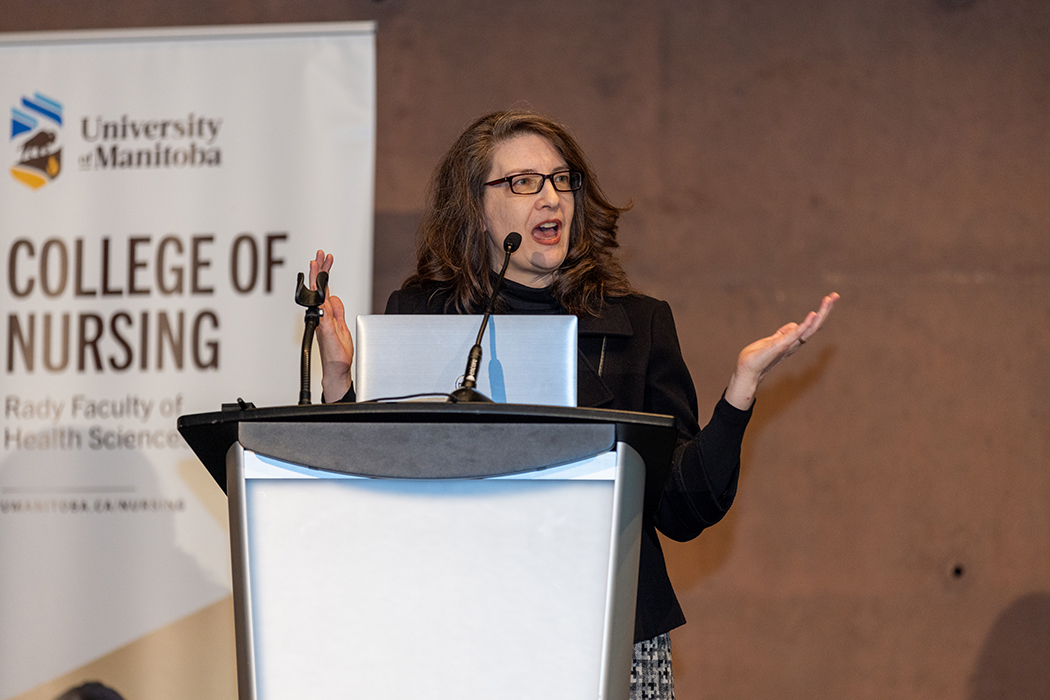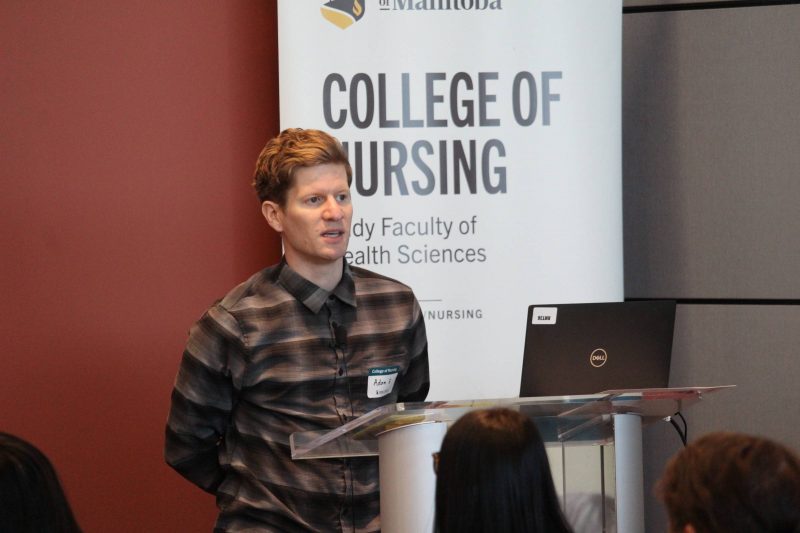
Dr. Ivy Bourgeault at the Helen Glass Lecture.
Health researchers, students an ‘untapped resource’ for workforce crisis
Canada’s health workforce is in the midst of a crisis caused by a vicious cycle of work overload, burnout and rising attrition, Dr. Ivy Bourgeault told attendees of the 2024 Helen Glass Lecture on March 4.
She also called the country’s health researchers and students an “untapped resource” that needs to be leveraged to address the situation.
About 80 people attended the lecture, which is part of the Helen Glass Research Symposium, a two-day event hosted by the College of Nursing, Rady Faculty of Health Sciences. The symposium returned to the Canadian Museum for Human Rights for the first time since 2019, after being held virtually in 2021 and 2022.
Bourgeault, researcher-in-residence for the event, is a professor of sociological and anthropological studies at the University of Ottawa and has been cited internationally for her research on the health workforce, particularly through a gender lens.
“It is important to think not just of the gender of the person doing that work, but the gender of the work. Health care work is structured along gendered lines and it is permeated with gender identity, but also gender roles and gender relations,” she said.
She said Canadians often feel superior to Americans because of health care access, but she said that access has been “on the backs of” health workers. “I’m going to evoke my farming background here. The chickens have come to roost.”
Bourgeault said Canada’s health system needs to focus on a more “virtuous cycle…of retain, return, recruit” with retention of the current workforce as the top priority.
“Retention is the best return on public investment,” she said. “We need to harmonize wages and benefits across different settings and practitioners.”
“Here’s the conundrum – the health workforce in Canada is increasing, especially for women, but health care work capacity overall is decreasing. If there is one take home message from this lecture that I want you to go away with, it’s that headcounts do not equal capacity.”
The event also included greetings from Dr. Netha Dyck, dean of the College of Nursing, Dr. Nicole Harder, associate dean, undergraduate programs in the College of Nursing and Mindermar Professor in Human Simulation, Rady Faculty of Health Sciences ,and Dr. Vanessa Van Bewer, assistant professor, Red River Métis scholar and storyteller in the College of Nursing.
Dr. Diana MacMillian, College of Nursing professor and clinical chair at Health Sciences Centre, provided a tribute to the symposium’s namesake, the late Dr. Helen Glass, former director of the University of Manitoba School of Nursing.
“It was from 1990 to 1993 that I had the very good fortune to serve as Dr. Glass’s research assistant,” McMillan said. “Nothing was impossible when this dynamo brought her vision, astute timing, hard work and evidence-based persuasion to the table.”
Watch the Helen Glass Lecture.
The second day of the symposium included a graduate student poster competition featuring 16 nursing PhD and master’s student participants. Five students received awards of $200 for their presentations.

Adam Brandt
Master’s student Adam Brandt received the highest marks for his thesis looking into the experiences of 2SLGBTQIA+ nurses in Winnipeg and how their identities affect their practice.
“Hopefully findings of this study will make a case for increasing equity, diversity inclusion and representation within nursing,” Brandt said.
The other poster competition winners were:
- Ashley Bell – The Neonatal Intensive Care Unit Care Experiences of 2SLGBTQIA+ Parents: A Proposed Study
- Kristine Doell – Transition into Long-Term Care: The Application of Meleis’ Theory on Transitions to Improve Nursing Care of Older Adults
- Jocelyn Elias – Discovering and Dreaming: Long-term Care Healthcare Aide Perceptions of Structural Empowerment
- Trinh Nguyen-Lu – Why so stressed? A proposed mixed methods study to explore stress, anxiety, and coping among newly graduated nurses working in acute care clinical environments






